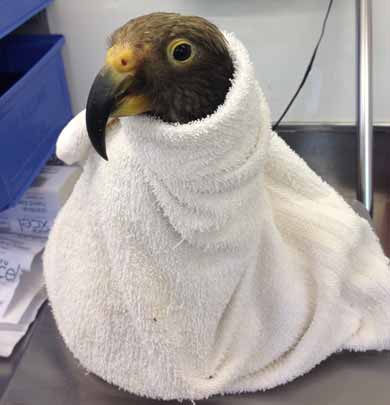Archived content: This media release was accurate on the date of publication.
Date: 13 April 2017

Kea during his daily weigh-in at Wildbase
Image: Massey University Wildbase
A young kea was released back into the wild in Fiordland yesterday after his severely injured leg was successfully remodelled by veterinarians at Massey University’s Wildbase Hospital.
The kea was picked up at West Arm, Lake Manapouri, with its leg twisted at right angles to its body, and was sent to Wildbase Hospital in Palmerston North for treatment in late December last year.
Massey University Wildbase Director Brett Gartrell said two separate surgeries were used to correct the badly twisted leg, which had probably been injured while the bird was in the nest. The leg was also pinned to an external frame to help straighten it.
“It took about a month for the bones to heal and muscles and joints to stretch to new positions, and then another two months using a mix of physiotherapy and encouragement to build up his strength and confidence in his new leg.”
His intelligence and curiosity made him a challenging patient, said Mr Gartrell.
“He learnt how to open our cages from the inside and spent some glorious hours making a mess in the hospital ward room. We will miss him very much, but it is definitely time for him to go!”
DOC Te Anau Operations Manager Greg Lind said the kea’s rescue and rehabilitation had been a collaborative effort with a very positive outcome.
“The kea had a terrible-looking injury and we weren’t at all sure he would survive. Wildbase have done an amazing job to fix his leg and get him to state where he can now be returned to the wild.”
“We’d also like to thank Real Journeys, whose staff picked up the injured bird and brought it in to DOC at Te Anau.”
The kea travelled from Palmerston North to Queenstown courtesy of Air New Zealand, before being taken by car, then Meridian Energy’s boat, to the release site at West Arm on Lake Manapouri.
Air New Zealand is a major partner with DOC in conservation, providing transport around the country for New Zealand’s most threatened species each year.
Massey University’s Wildbase is a teaching hospital for veterinarians and does not charge for treating injured wildlife. In 2016 Wildbase cared for 327 native animals including threatened species such as kākāpō, takahē, shore plover, rowi kiwi, kea and Otago skinks.
Kea is an endemic parrot only found in the South Island’s alpine environments. They are nationally endangered with predators such as stoats and possums a key threat.
Contact
For media enquiries contact:
Email: media@doc.govt.nz